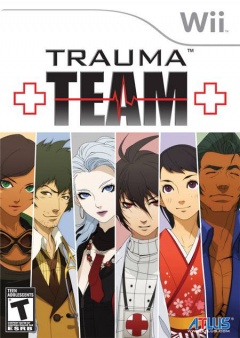trauma team
Trauma Team
 Classifying video games into genres can be a tricky ordeal. For
example, let's look at Fable.
It's a role-playing game because it uses
dynamic statistics as modifiers to its core mechanics, right? But one of
the
traditional indicators of an RPG video game is that it plays out with
little regard to nuanced player input: its action is menu driven and
often
turn based. Fable's real-time combat, on the other hand, relies on
player dexterity (as in an Action game) as much as it does the
quantifications of the battle engine. So, in our propensity to create
subgenres when things don't fit so neatly, we just call it an Action
RPG. However, it's hard to be satisfied with this conclusion when one
could replace every instance of "Fable" in this paragraph with "BioShock," "Mass Effect," or even "Star Ocean" and it would be no less true, even if all of these
games feel completely different in once you get your hands on the
controller.
Classifying video games into genres can be a tricky ordeal. For
example, let's look at Fable.
It's a role-playing game because it uses
dynamic statistics as modifiers to its core mechanics, right? But one of
the
traditional indicators of an RPG video game is that it plays out with
little regard to nuanced player input: its action is menu driven and
often
turn based. Fable's real-time combat, on the other hand, relies on
player dexterity (as in an Action game) as much as it does the
quantifications of the battle engine. So, in our propensity to create
subgenres when things don't fit so neatly, we just call it an Action
RPG. However, it's hard to be satisfied with this conclusion when one
could replace every instance of "Fable" in this paragraph with "BioShock," "Mass Effect," or even "Star Ocean" and it would be no less true, even if all of these
games feel completely different in once you get your hands on the
controller.
Trauma Center: Under the Knife arrived on the scene in the Nintendo DS launch window, requiring players to perform lightspeed surgeries using a variety of medical instruments through the handheld's touch screen. Ignoring the dearth of surgery games (or even touch screen games) to use as precedent, Trauma Center was still very tough to define. Can we really use the catchall Simulation genre for a game where heart surgery lasts all of a minute and Space Invaders can be found in the patient's lungs? Is it part visual novel merely because operations are bookended and pervaded by character portraits and dialogue? Not content to let us try and figure it out after four games, Atlus' fifth title in the franchise, Trauma Team, complicates things further by providing six different scenarios to play through, each with its own exploration within (and sometimes a bit outside) the traditional Trauma Center structure.
Okay, so I don't really know what to call it. A more important concern, though, is whether or not it's fun. So how did my first hour go with this...whatever it is?
